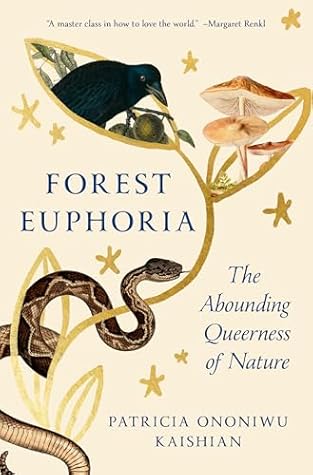More on this book
Community
Kindle Notes & Highlights
Read between
June 1 - June 9, 2025
Call upon the help of those who love you. These helpers take many forms: animal, element, bird, angel, saint, stone, or ancestor. —Joy
I was born an amphibian, in many senses. Few labels offered the satisfaction of total belonging, and I sensed this very early, before I had the language or perspective to grasp it.
There is value in the in-between and uncategorized, even in a culture that rewards certainty.
I felt safest when I was unwitnessed by other people. I could move outside of society’s gaze, outside the grip of cultural prescriptions and interventions. My hair could run wild, I could dress androgynously, I could be covered in mud. Being in the culvert or the forest was a chance to move amphibiously, to shape-shift, to creep, to oscillate like algae in a riffle, to be neither a boy nor a girl and have no particular identity at all.
like blurring the line between human and nature because I believe we, as a species, have become profoundly lonely in our self-enforced isolation.
And I hope that in sharing these stories, you too will feel the closeness of the earth, the lack of space between our cells, and the memory of each other.
While many things about our human bodies and behaviors make us distinct from other species, it is unscientific hubris to build a hierarchy out of these traits. This hubris is what has thrust the planet and all its inhabitants into crisis.
To sustain this motivation, I turn back to the word “queer,” which summons a spirit of camaraderie and a history of defiance.
For me, the forests and mucky places of my childhood were sites for queer expression and euphoria, presenting me with a family both chosen and biological.
I hope to illuminate a path for remembering. I hope to blur the lines between us and them. I want us all to be philopatric snakes in an interspecies den.
What if, instead of the “birds and the bees,” we told kids about slugs?
Men are trained to repress their emotional range; they are presumed to always want sex. Discouraged from genuine friendships with women and from true intimacy with other men, collectively, they are in the middle of a terrible loneliness crisis.
but I do like to think about what I can forage from this world that used to be mine. What categories can I blur? What if we bring, metaphorically, the swamp and the forests inside?
Our bodies are ancient communal swamps. The swamp is never any one thing on its own; nothing in the swamp can be isolated and understood fully. It is full of species living alongside one another.
The impulse to summon desire with beauty—for us, by experimenting with new combinations of brushstrokes, instruments, or written text—is as fundamental as perception itself.
Like humans, cicadas are bound by time, but instead of calibrating to units like seconds and minutes, they calibrate to pulses of sap and the change in soil temperature.
Like humans, cicadas find safety in groups, in patterns, and in the abundance of the springtime forest.
I couldn’t contain my desire for belonging. I wanted to walk in the mountains and feel something tremble, something to tell me with total certainty that I was home. I was unabashedly looking for magic: I expected to feel the land recognize me back, to feel the magnets click into place. As time passed and no such thing happened, I grew afraid that I had been forgotten; too much time had passed, and my lineage was too fractured.
A signaling to the eels: You are home now. Grow old here.
These are the realities that make me think, The apocalypse has already happened, even as I know things can always get worse.
and I molted repeatedly before finding connections that seemed like they would truly last.


